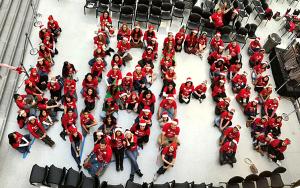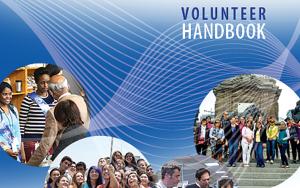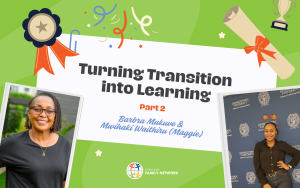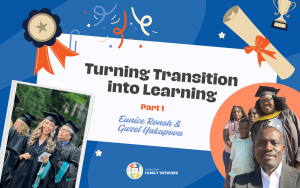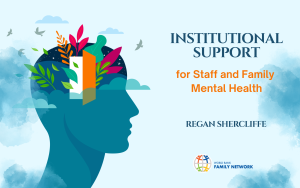
This is one of two articles about WBG families dealing with a child’s developmental disability. The articles focus on the spouse’s perspective.
Nelly felt there was something wrong with her son, Pierre, by the time he was a toddler. He was very quiet and sedentary. He was clumsier than other children of his age. He had problems eating. The pediatrician told her not to worry. Nevertheless, she asked for hearing and vision tests. They were normal. Nelly is a psychologist, and though she felt this gave her the training to identify problems, it also led everyone around her to think she was overreacting.
When Pierre was eighteen months, Nelly’s husband took a position at the WBG and they relocated to Washington DC. Nelly got right to business with her son’s new pediatrician, and persuaded her to authorize some tests. Again, the results were normal, and the pediatrician insisted that Nelly be patient. Waiting is not Nelly’s style and she took Pierre to see the doctor so often that, “she stopped wanting to see me!”
Doing her own research, Nelly identified a testing service with a three day evaluation using specialists in different therapy fields, which Pierre took when he was three. This time, the results indicated that he had Developmental Coordination Disorder (DCD), also known as dyspraxia, which affects the planning and processing of physical tasks, such as talking, eating, dressing, playing, or just walking. There are often accompanying social emotional issues, learning delays, and in Pierre’s case, a mild intellectual delay. It’s an invisible handicap, comments Nelly, because, “it’s subtle—you don’t see it right away.”
DCD is not outgrown, but intensive therapies while young can make a real difference. Pierre entered a special education program at his local elementary school that had both a psychologist and occupational therapist on staff. Every day after school, Nelly picked him up to take him to either speech, physical or further occupational therapy. This routine has been continuing for three years, with the addition of academic tutoring now that Pierre is in grade school.
School has been a big challenge for Pierre, but he is keeping up and even scored 72% on a recent math test, to Nelly’s deep pleasure. He has a gentle character and likes to hug, which attracts nurturing from his schoolmates. He is shy and doesn’t talk much, but he now has some friends. He is beginning to learn to ride a bike, can dress himself, and doesn’t fall and hurt himself so much. He is sometimes a restless sleeper, and nights can be difficult.
Every summer, Nelly takes Pierre and his younger brother back to Belgium, her husband’s home country, and to Burundi, her own. Their stays provide many contrasts for Pierre. In Belgium, he attends a summer camp. In Burundi, there are more open spaces and he is outdoors, interacting informally with many other children, who are friendly and inviting. Last summer he watched some kids playing soccer and tried it himself. In Burundi and Belgium, he is surrounded by a large extended family, and the constant interaction gives him the confidence to speak more. Although he answers everyone in English he understands both French and Kirundi.
Although Nelly’s day is still dictated by Pierre’s needs (including dealing with the complex world of health insurance), her professional training and years of persistent investigation into her son’s condition have opened up another area of interest for her. Recently she joined the team working on the new WBFN Disabilities Program, which will launch in February 2019. This program will provide informational and peer group support for WBG families. Nelly’s role is to create a database of resources in Washington DC, which will be of particular help to newly arrived families. The information on resources will come from WBFN members who have personal experience in special needs, and will include recommendations for hospitals, therapists, and school programs in the Washington DC area. Nelly hopes that ultimately, the database will include information from members in country office locations as well.
Recently, Nelly admitted to herself that she was exhausted, and also feeling guilty that she wasn’t spending enough time with her younger son. She recognizes that she needs support and is looking for a psychotherapist of her own to help her work on staying centered. She has also come to terms with her husband’s demanding job. She would love to have him around more, but “it’s not realistic or fair”. He travels a lot, and works late and on weekends. “I used to work, and you have to make a choice. You are home or you’re at work, but doing both is impossible.”
Nelly says about her son’s disability, “there was no road map for me”. She has learned everything through her own investigation or from other parents she has met along the way. For example, she created a WhatsApp group for local parents of children with dyspraxia. She identified the parents by approaching them in hospital waiting rooms to ask if their child had DCD as well. There are about five people currently in the group, and it has become a very useful way to share information and tips. It is initiatives like this, and the database for the Disabilities Program, that Nelly feels will be vital resources—basically a road map— for families who face the enormous challenges of caring for a family member with special needs in a new country.

